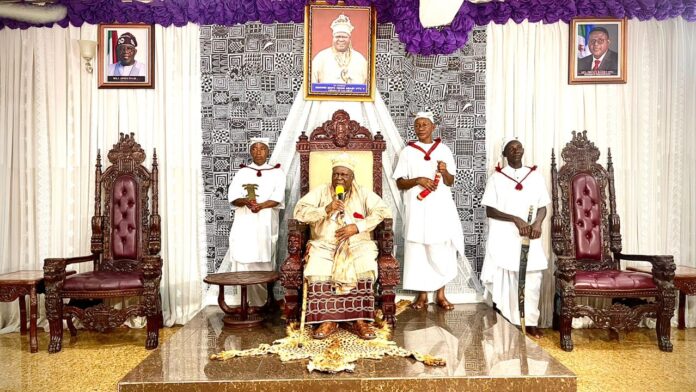© Holyns Hogan, 2023
In my most recently published public lecture and reputed peer-reviewed academic journal article, I offered useful research information about my historically authenticated origin and reason for the two quoted phrases/sayings in the subject.
Of course, I had rightly mentioned therein, that, great King Eyamba (V), eurocentrically described in Oku (1991) as -a pompous, fearsome, highly influential, wealthy, powerful and industrious Efik ruler in the 1800s- (paraphrased by me), is the natural originator of the statements that led by inference to the advent and subsequent popularization of both phrases. Eyamba (V) boastfully and fearlessly proclaimed himself as “the king of all blackman” (sic)-origin of EFIK EDI MME AKARA KE IDO, EDU YE USEM. He described his maternal cousin Eyo (II) as “whiteman king” (sic)- origin of EFIK EDI MBAKARA.
Eyamba (V) made both statements to respectively express his anger/slur against then British colonial authority and Eyo (II), regarded as his “arch bloodline foe”… for creating/accepting diarchy to water down/restrict his influence to ancient Calabar, while Eyo (II) was coronated to rule parallelly at the same time in Creek Town (Oku, 1991).
Another very important reason for the sustenance and popularization of EFIK EDI MBAKARA was/is to figuratively use metaphor to infer that Efik is comparatively greater or superior to her equals because of her historical achievements as the first southern Nigeria nation/kingdom to be Europeanized, Christianized, formally educated or forced/lured or brainwashed to totally accept Western civilization and mentality as reason for being often remembered for portraying white culture as ancient super power in all ramifications of life. However note that despite being figuratively used to imply Efik similitude to the English in terms of decency, civility/modesty, etiquettes, honesty and/or hospitality, Efik truly has her original civilization, mentality or personality to pride in/ is never really mbakara (the Efik name for English/ European or white race in general) by nature, race or cultural heritage. Rather EFIK EDI EFIK!
Afrocentric critics are no doubt right in their racial angle, particularly when judged against reality that the whites of the West-origins (mbakara-Europe and America), not only see black as “devil’s from a dark continent”, but persistently take delight in bragging and attempting to impose their so called “whites supremacy” on the black race… to which Efik naturally belongs. Precisely, these critics belief that away from being seen as a metaphor, it is literally subjugating, degrading and inferiorating to call Efik mbakara where no purely whites nation ever regarded her people as blacks (whether literally or literarily), not even in “best case scenario”. Exponents further believe that is better for posterity sake to promote EFIK EDI EFIK than pride in the metaphorical delusion that makes some Efik to generally/sarcastically drown in the mentality of being what they actually are not by nature and race.
Also, it must be instructively noted or understood from history that, EFIK EDI MME AKARA, shortened to EFIK EDI MM’AKARA (translated to Efik are rulers or leaders) is equally popularized for two main reasons. Firstly, for Efik regrettable roles as the indigenous championers, masters and beneficiaries of ancient international slave and later palm oil trade in Old Calabar history. Secondly because Obio Efik (officially called Calabar) was the first Southern protectorate and Eastern region capital of then amalgamated Nigeria in early 1900s.
Besides Calabar was seen as the seat of power/military exploits for the entire lower Cross River basin, parts of Western Cameroun, neighbouring riverine areas, Rio etc. All these exploits, though the glories of the past, no doubt offer strong reasons that Efik still maintains that she worths being eternally glorified as the premier indigenous ruler of now Nigeria South and South East for the aforementioned facts in history.
All rights of copy @Holyns Hogan, 2023.










